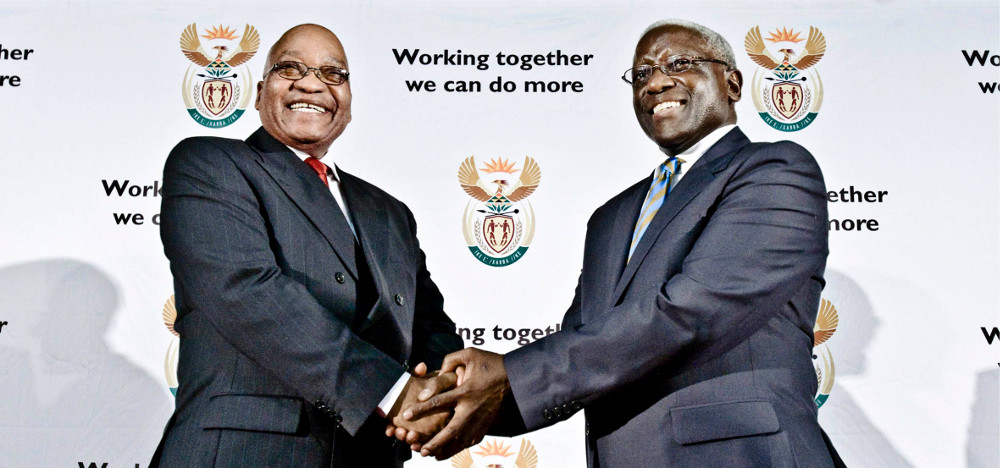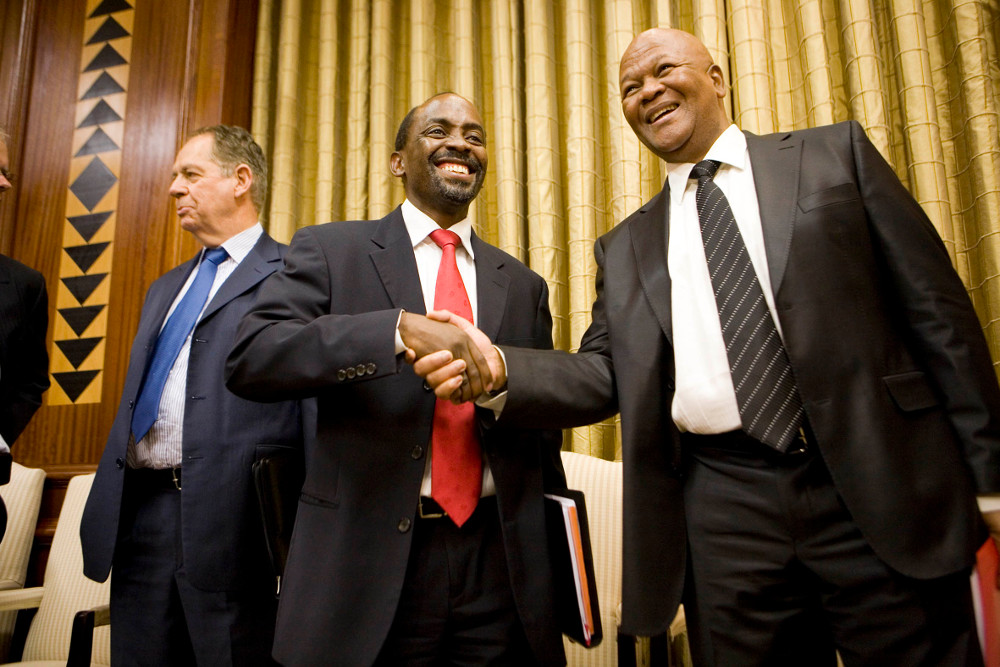Michael Hulley
Despite a series of legal blunders and embarrassments, plus a gatvol security cluster of ministers, President Jacob Zuma is sticking with his team of legal advisers, even though they don’t advise the president “properly”. Just last week, a meeting of irate security cluster ministers raised concerns about the quality of legal advice given to Zuma, the Mail & Guardian has learned.
Zuma has relied heavily on the security cluster – which includes the ministers of justice, intelligence, defence and police – to help him to negotiate a number of storms such as the controversy around the upgrades of his Nkandla home and the standoff with the national director of public prosecutions, Mxolisi Nxasana.
This is not the first time the quality of Zuma’s legal advice has been questioned, but the president remains unmoved.
Zuma has appointed two legal advisers to his presidency office, but Michael Hulley, once his personal lawyer and now legal adviser to him as president, is in effect his chief adviser. Hulley became Zuma’s lawyer when, as deputy president, the latter faced corruption charges in 2005. He continued to assist Zuma with legal challenges until he was appointed part-time legal adviser in the presidency in 2011. As this is only a part-time gig, Hulley continues to run his legal practice on the side, while advising Zuma both in his personal capacity and as state president. It is this conflated relationship that has irked some Cabinet ministers and ANC leaders.
“The concern is that Michael Hulley in particular is being kept too close to the president because he has become more than just a lawyer,” a government official said. “There have been many attempts to say ‘let’s change these people, they are embarrassing the state.’ The challenge is that nothing is happening,” said a government official who has insight into the inner workings of government.
“Hulley is in control. He is now in Zuma’s government, so the relationship is more complicated. They are together in business and it’s not easy to remove him from office. The complication is that if Zuma removes Hulley, for instance, what about their business relationship? He needs to consider that.”
Quality of advice
The official said that the quality of Zuma’s legal advice has been an issue of discussion for a long time.
“In fact his legal advisers have been almost a permanent feature of the security cluster’s discussions,” the official said. “There have been many instances where it’s been felt that these people are not advising the president properly.”
Zuma’s lawyers last week conceded in the Supreme Court of Appeal that they could not make an argument for refusing to hand over the “spy tapes” to the Democratic Alliance. The lawyers have been fighting the opposition party’s bid to get their hands on the recordings, which were used as a reason to withdraw corruption charges against Zuma in 2009.

Zuma failed to extend the term of former chief justice Sandile Ngcobo. (Leon Botha, Gallo)
“It is depressing to go all the way to Bloemfontein [the seat of the Supreme Court of Appeal], then admit that you do not have a case,” the official said. “After spending so many millions on the case, why is it that the lawyers could not see that it is not worth fighting further?”
M&G sources claim some ministers and directors general in the security cluster agreed that Zuma’s legal team needs a wake-up call, and that even the previous security cluster concurred that Zuma’s legal blunders were the result of the advice he received.
Embarrassing moments
Embarrassing moments for Zuma include the bungled attempt to extend Justice Sandile Ngcobo’s term as chief justice, and the appointment of Willem Heath as head of the Special Investigating Unit in 2011 – which also caused unhappiness because he had been part of the “brains trust” team that, together with Hulley, helped to get corruption charges against Zuma dropped.
Heath resigned just two weeks into his appointment, after claiming that former president Thabo Mbeki had engineered rape and corruption charges against Zuma.
In 2012 the Constitutional Court declared Menzi Simelane’s appointment as national director of public prosecutions “inconsistent with the Constitution and invalid”.
When asked to show on what basis the president had decided to appoint Simelane, the president – on advice – said he had just perused his CV.
But Hulley has nonetheless succeeded in helping Zuma out of legal pickles. When Zuma failed to declare his and his family’s business interests for about a year after he was appointed state president – contrary to the 60-day legal stipulation – it was Hulley who managed the crisis.
“The attendant delay in completing this task responsibly has created an opportunity for some to unfairly speculate without substance,” he said after Zuma eventually made the long-awaited declaration in 2010.
Ball in Zuma’s court
Zuma’s other legal adviser in the presidency is Bonisiwe Makhene, who was seconded from the department of justice, although government sources said she was recommended by one of Zuma’s “kitchen cabinet” members.
“The ball is in Zuma’s court to decide what to do with his legal advisers,” the government official said. “You can say there is no appreciation for the amount of problems we are experiencing and what is causing them.”
A response to a DA question in Parliament last November revealed that Zuma’s attorneys were paid more than R8.8-million in the four years since 2009.
Former justice minister Jeff Radebe’s written reply said law firm Hulley & Associates received R7 945 971 in the 2009-2010 financial year, R570 068 in 2010-2011 and R327 890 in 2012-2013. These amounts were for cases relating to the multibillion-rand arms deal as well as the “spy tapes”. As a part-time special legal adviser, Hulley is paid at a rate of just under R700 an hour.
Hulley has been linked to two companies registered in the British Virgin Islands, Caprikat and Foxwhelp, which were fronted by the president’s nephew Khulubuse Zuma in the controversial oil exploration rights deal in the Democratic Republic of Congo. He was also listed as a director of the now liquidated mining company Aurora Empowerment Systems, together with Khulubuse, among others.
Confidential discussions
Justice minister Michael Masutha told the M&G this week that security cluster meeting discussions were confidential. “I don’t think the matter you are raising is at the stage of public communication yet. We are not yet at the stage where we can table that matter for public consumption.”
Asked whether the security cluster meeting had discussed the quality of legal advice given to Zuma, Masutha said: “If there is a law exercised by the president, we generally would be the ones assisting the president with any constitutional and legal matter. We are the office that processes such things.” He said he was not in a position to share any more information on the matter.

Zuma’s appointment of NPA head Menzi Simelane, shaking hands with then justice minister Jeff Radebe, was overturned in court. (Samantha Reinders)
Masutha said the Nxasana case was “complex …. I would generally be reluctant to discuss any aspects of that matter. At this stage this is still an internal matter and it’s complex.”
Some ministers who form part of the security cluster claimed not to know anything about the discussion on Zuma’s legal advice.
Last week Zuma issued a statement on his submission to the speaker of the National Assembly, Baleka Mbete, on the Nkandla upgrades, but when the M&G called the legal advisers to explain the rationale behind the timing of the submission, Hulley and Makhene referred the newspaper to each other; neither could answer the questions.
Blame game
ANC national executive committee member Billy Masetlha has defended Zuma’s choice of legal advisers, saying they stood by him during the corruption and rape trials when no one else was there for him.
He said ministers in the security cluster should take the blame for the embarrassment caused as a result of appointing people who are not fit for office.
Masetlha said the ANC’s peace and stability subcommittee had long raised concerns regarding the appointment of people to key government positions without vetting the candidates first.
“Some of these questions we put them on the table long time ago. The same comrades in the security cluster were present in the [ANC] meetings,” Masetlha said. “We even had to get the president to intervene … to a point where we said to the director general in the presidency he needed to make sure that the president always checks [if vetting was done for key appointments]. We were almost at blows when we dealt with the Waterkloof [Gupta aircraft landing] scandal. Ministers must take the major blame. They are not immune.”
Masetlha said security cluster ministers “may be opportunistic now”, but that the issue of Zuma’s legal advisers was “not an isolated case. If they [had] asked us before, we could have given guidance on [Nxasana]’s appointment.”
‘No regulation’
On Hulley, Masetlha said: “Advisers must be vetted. Hulley might pass the test, but politically he might not. As an adviser there is no such regulation.”
In 2011, when presidential spokesperson Mac Maharaj was asked whether Hulley was vetted before his appointment, he told the M&G Zuma was within his rights to appoint Hulley.
“All of us go to the ones we know best. Zuma has respect for his [Hulley’s] legal abilities. You’ve had controversy about all sorts of appointments. This is a free country.”
Hulley did not return M&G calls and text messages this week. Makhene also refused to respond to M&G questions.
Maharaj said the sources of the M&G were spreading “rumours and gossip” that he described as “disappointing and baseless”.
“Advice to the president within government comes from various sources, especially line function ministers, in addition to his personal support staff such as advisers,” Maharaj said. “If people have constructive suggestions to make on any issue in order to improve the performance of government they must use correct forums instead of spreading malicious rumours.”
Tenders and bold claims: President’s lawyer no stranger to controversy
President Jacob Zuma’s lawyer Michael Hulley controversially believes that his client can’t be prosecuted during his term in office.
“I have been advised that the incumbent state president, like the president of the United States, cannot be charged with criminal conduct [or continue to be prosecuted] during his incumbency,” Hulley responded to the Democratic Alliance in an affidavit in 2009. The DA had applied to the high court in Pretoria to review the National Prosecuting Authority’s decision to withdraw charges against Zuma.
“Charges can only be brought if he is successfully impeached in terms of the Constitution or after his term of office ends,” Hulley said.
He is not new to controversy. The M&G reported in 2012 how the Durban lawyer played a major behind-the-scenes role in the awarding of a R10-billion social grants tender. He was apparently appointed as a “strategic adviser” to the South African Social Security Agency at R21?000 a day for providing “commercial, financial and legal advice”.
The tender was awarded to Cash Paymaster Services. The massive tender was challenged in court by losing bidder Allpay Consolidated Investment Holdings, which decried allegations of corruption.
Hulley has been linked to two British Virgin Islands registered companies, Caprikat and Foxwhelp, which were fronted by the president’s nephew Khulubuse Zuma in the controversial oil exploration rights deal in the Democratic Republic of Congo.
Hulley was also listed as one of the directors of the now liquidated mining company Aurora Empowerment Systems, though he said he was just an adviser. Liquidators of Pamodzi Gold mines appointed Aurora to manage the mines in 2009, when they were still fully operational, but the mines were soon run into the ground after that botched takeover. Aurora workers are still owed salaries even after the Labour Court issued an award against the company’s directors to pay. Trade unions in the mining sector raised suspicions that the political connections protected Hulley and fellow Aurora directors from prosecution.